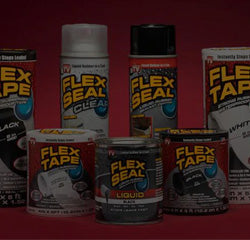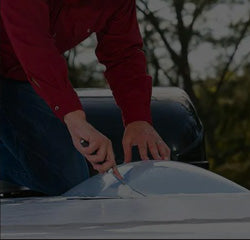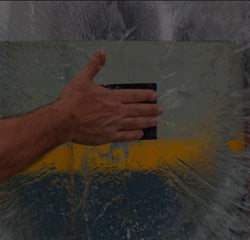How To Seal Garage Doors
Our video below will maximize your success when preparing for a flood using the Flex Seal Flood Protection line. Garage doors can vary in shape and design, so it is important to seal any area where water may enter.
IMPORTANT
Always follow evacuation orders. Heed all directions from local government and emergency management officials. Watch our introductory video before starting.
Liquid error (templates/article.flood-garage-doors line 16): Error in tag 'section' - 'flood-jump' is not a valid section type
Materials
Tools Used:
• Caulk Gun
• Flex Gap Filler Tool
• Paint Brush
• Putty Knife
• Protective Gloves
• Eyewear
• Caulk Gun
• Flex Gap Filler Tool
• Paint Brush
• Putty Knife
• Protective Gloves
• Eyewear
IMPORTANT
Flood Paste in a Cartridge is the base coat for your first layer of protection. Use a gloved finger, Flex Gap Filler tool, or similar tool to push into all seams and openings to help create a watertight seal. Always be cautious of any sharp objects that may cause injury.
Apply Paste
Once your garage is closed tight, you're ready to start sealing it. Start by applying a medium bead along the bottom where the garage door meets the foundation and continue up each side.
Once applied, use your finger to push it in and smooth the area being sealed. A common mistake is not pushing it in with your finger deep enough after application.
If your garage door is sectional, you'll want to apply a bead of Flood Protection Paste to the seams of each section where you think flood waters may rise.
Once applied, use your finger to push it in and smooth the area being sealed. A common mistake is not pushing it in with your finger deep enough after application.
If your garage door is sectional, you'll want to apply a bead of Flood Protection Paste to the seams of each section where you think flood waters may rise.
Apply Tape
After the first application of Flood Protection Paste, we recommend applying Flood Protection Tape along the bottom of the garage door. You can apply it on wet or dry Flood Protection Paste. Cut it in two-foot-long sections and remove the backing. Carefully fold Flood Protection Tape in half. Then apply it to the floor first, push it into the seam from the center, continue pushing it in, and smooth it out with your hand.
Next push in the other half against the door, starting at the center. And again, pushing in while you're smoothing it out. Don't forget to overlap each Tape section two to three inches.
After you've applied Flood Protection Tape to the bottom of the door, you'll want to apply additional layers of Flood Protection Paste to all the exposed Tape edges. This includes where you've overlapped the Tape sections. Once you've sealed all the areas, including the seams, sides, the bottom and the Tape edges, you have to let it dry.
Next push in the other half against the door, starting at the center. And again, pushing in while you're smoothing it out. Don't forget to overlap each Tape section two to three inches.
After you've applied Flood Protection Tape to the bottom of the door, you'll want to apply additional layers of Flood Protection Paste to all the exposed Tape edges. This includes where you've overlapped the Tape sections. Once you've sealed all the areas, including the seams, sides, the bottom and the Tape edges, you have to let it dry.
Additional Layers
If you applied Flood Protection Paste in thin, even layers, you should expect it to be dry to the touch in two to six hours. Next, we recommend applying additional coats of our Flood Protection Paste.
Follow the same application process as the first layer, but each individual coat that you apply should be wider and overlap the previous layer of Flood Protection Paste and Tape.
Once the doors have been sealed and are completely dry and you already have multiple layers of Flood Protection Paste, we recommend using our Flood Protection Liquid as an additional layer of protection.
When applying our Flood Protection Liquid, use your brush and apply it directly on top of our Flood Protection Paste and Tape, making sure you overlap your final coat, this will help cover any pinholes or openings that you can't see. Don't forget to seal around the garage door handle and lock.
Remember you want to make sure all the flood protection products are fully cured before a flood arrives.
For additional help, click on one of our how-to options below, or call us at:
833-4-A-FLOOD (833-423-5663).
Follow the same application process as the first layer, but each individual coat that you apply should be wider and overlap the previous layer of Flood Protection Paste and Tape.
Once the doors have been sealed and are completely dry and you already have multiple layers of Flood Protection Paste, we recommend using our Flood Protection Liquid as an additional layer of protection.
When applying our Flood Protection Liquid, use your brush and apply it directly on top of our Flood Protection Paste and Tape, making sure you overlap your final coat, this will help cover any pinholes or openings that you can't see. Don't forget to seal around the garage door handle and lock.
Remember you want to make sure all the flood protection products are fully cured before a flood arrives.
For additional help, click on one of our how-to options below, or call us at:
833-4-A-FLOOD (833-423-5663).
Get Flood Protection Now
 Buy Now
Buy Now
We’re proud to say that when used in combination, and as directed, our Flood Protection
Products have been independently verified by UL Solutions to hold back 3ft of water for 14 days on gaps up to ½ inch.
Tested in laboratory settings.











